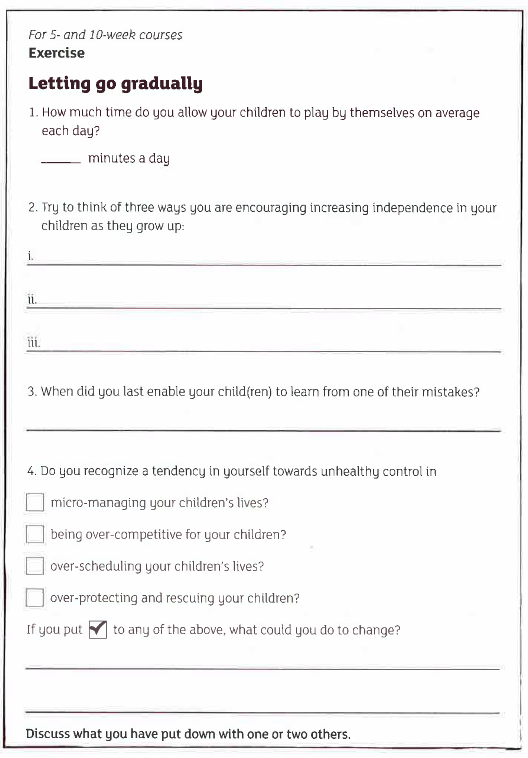Loading Content...
Share a Link to this Message
The link has been copied to your clipboard; paste it anywhere you would like to share it.
CloseParenting Teens - September 2, 2012
Day 17 - Effective Communications

Parenting teenagers involves gradually letting out the boundaries and giving increased freedom and responsibility. We compare different parenting styles (neglectful, authoritarian, indulgent and authoritative) and show how a combination of warmth and firmness (authoritative parenting) is the most beneficial to a teenager’s healthy development.
Adapting our approach
• Communication not always easy through the teenage years
• learning curve for most parents
• adults and teenagers tend to communicate in different ways
See attached file for some differences!
• if we allow them to tell us what they find difficult about how we communicate with them, they are more likely to listen to us when we need to tell them what we find difficult about how they communicate with us
• understand that sometimes teenagers like to be contrary. (If we get heavy and intense they will probably react strongly just to give us a hard time)
• give them space. Respect their privacy.
• don't try to control every aspect of their lives.
• don't expect them to tell you everything
Question:
How easy or difficult is it for you to communicate with your teenager(s) currently?
See the attached worksheets in the study guide
From Series: Parenting Teenagers | More Messages from Parenting Teens | Download Audio
From Series: "Parenting Teenagers"
More Messages Associated With "Family"...
| Day 1 - Introduction | August 13, 2012 | Watch | Listen | ||
| Day 2 - Challenges | August 14, 2012 | Watch | Listen | ||
| Day 3 – Family Provides Support | August 15, 2012 | Watch | Listen | ||
| Day 4 – Family Provides Fun & A Moral Compass | August 16, 2012 | Watch | Listen | ||
| Day 1 - Introduction | August 17, 2012 | Watch | Listen | ||
| Day 5 – Experiencing & Observing Healthy Relationships | August 17, 2012 | Watch | Listen | ||
| Day 2 - Making Adjustments | August 18, 2012 | Watch | Listen | ||
| Day 6 – Practicing Healthy Relationships (and Parenting Alone) | August 18, 2012 | Watch | Listen | ||
| Day 3 - Making Adjustments Part II | August 19, 2012 | Watch | Listen | ||
| Day 7 – Setting Goals and The Importance of Play | August 19, 2012 | Watch | Listen | ||
| Day 4 - Understanding the Pressures | August 20, 2012 | Watch | Listen | ||
| Day 8 – Screentime | August 20, 2012 | Watch | Listen | ||
| Day 4 - The Third and Fourth Seasons of Marriage - Autumn and Winter | Marriage Course | August 20, 2012 | Watch | Listen | |
| Day 5 - Remembering our Long Term Aim | August 21, 2012 | Watch | Listen | ||
| Day 9 – The Importance of Bonding | August 21, 2012 | Watch | Listen | ||
| Day 6 - Home - A Place of Safety and Acceptance | August 22, 2012 | Watch | Listen | ||
| Day 10 – The Importance of Establishing Routines | August 22, 2012 | Watch | Listen | ||
| Day 7 - Home - A Place to Learn Good Values | August 23, 2012 | Watch | Listen | ||
| Day 11 – Bedtimes | Parenting Children | August 23, 2012 | Watch | Listen | |
| Day 8 - Home - A Place of Fun | August 24, 2012 | Watch | Listen | ||
| Day 12 – Introduction to the Love Languages | August 24, 2012 | Watch | Listen | ||
| Day 8 - Nurture Each Other | Marriage Course | August 24, 2012 | Watch | Listen | |
| Day 13 – Introduction to the Love Languages II | Parenting Children | August 25, 2012 | Watch | Listen | |
| Day 9 - The Art of Communication | Marriage Course | August 25, 2012 | Watch | Listen | |
| Day 9 - Home - A Place to Learn Good Relationships | August 25, 2012 | Watch | Listen | ||
| Day 14 – Love Language – Affirming Words | Parenting Children | August 26, 2012 | Watch | Listen | |
| Day 10 - Effective Communication | Marriage Course | August 26, 2012 | Watch | Listen | |
| Day 10 - Family and Meal Times | August 26, 2012 | Watch | Listen | ||
| Day 15 – Love Language – Affectionate and Appropriate Touch | Parenting Children | August 27, 2012 | Watch | Listen | |
| Day 11 - The importance of listening | Marriage Course | August 27, 2012 | Watch | Listen | |
| Day 11 - Love Languages | Parenting Teens | August 27, 2012 | Watch | Listen | |
| Day 16 – Love Language – One to One Time | August 28, 2012 | Watch | Listen | ||
| Day 12 - Love Language - One to One Time | Parenting Teens | August 28, 2012 | Watch | Listen | |
| Day 17 – Love Language – Thoughtful Presents | Parenting Children | August 29, 2012 | Watch | Listen | |
| Day 12 - Hindrances to Listening - Filters | Marriage Course | August 29, 2012 | Watch | Listen | |
| Day 13 - Love Language - Affirming Words | Parenting Teens | August 29, 2012 | Watch | Listen | |
| Day 18 – Love Language – Kind Actions | Parenting Children | August 30, 2012 | Watch | Listen | |
| Day 14 - Love Language - Affectionate Touch | Parenting Teens | August 30, 2012 | Watch | Listen | |
| Day 15 - Love Language - Thoughtful Presents | Parenting Teens | August 31, 2012 | Watch | Listen | |
| Day 19 – Summary of the Love Languages | Parenting Children | September 1, 2012 | Watch | Listen | |
| Day 16 - Love Language - Kind Actions | Parenting Teens | September 1, 2012 | Watch | Listen | |
| Day 17 - Effective Communications | Parenting Teens | September 2, 2012 | Watch | Listen | |
| Day 18 - Engaging in Dialogue | Parenting Teens | September 3, 2012 | Watch | Listen | |
| Day 20 - Combining Love and Limits - Why Boundaries Matter | Parenting Children | September 3, 2012 | Watch | Listen | |
| Day 19 - Effective Communications Strategies Part I | Parenting Teens | September 4, 2012 | Watch | Listen | |
| Day 21 - The Challenges of Setting Boundaries | Parenting Children | September 4, 2012 | Watch | Listen | |
| Day 20 - Effective Communications Strategies Part II | Parenting Teens | September 5, 2012 | Watch | Listen | |
| Day 22 - Where do we set boundaries | Parenting Children | September 5, 2012 | Watch | Listen | |
| Day 21 - Effective Communications Strategies Part III | Parenting Teens | September 6, 2012 | Watch | Listen | |
| Day 23 - Setting Boundaries Part I | Parenting Children | September 6, 2012 | Watch | Listen | |
| Day 24 - Setting Boundaries Part II | Parenting Children | September 7, 2012 | Watch | Listen | |
| Day 25 - Helping Children Make Good Choices Part I | Parenting Children | September 8, 2012 | Watch | Listen | |
| Day 26 - Helping Children Make Good Choices Part II | Parenting Children | September 9, 2012 | Watch | Listen | |
| Day 27 - Helping Children Make Good Choices Part III | Parenting Children | September 10, 2012 | Watch | Listen | |
| Day 28 - Helping Children Make Good Choices Part IV | Parenting Children | September 11, 2012 | Watch | Listen | |
| Day 29 - Modeling and Practicing Relationships - The Power of Listening | Parenting Children | September 12, 2012 | Watch | Listen | |
| Day 30 - The Power of Listening - Part I | Parenting Children | September 13, 2012 | Watch | Listen | |
| Day 31 - The Power of Listening - Part II | Parenting Children | September 14, 2012 | Watch | Listen | |
| Day 32 - Relationships with siblings and other children Part I | Parenting Children | September 15, 2012 | Watch | Listen | |
| Day 33 - Relationships with siblings and other children Part II | Parenting Children | September 16, 2012 | Watch | Listen | |
| Day 34 - Relationships with siblings and other children Part III | Parenting Children | September 17, 2012 | Watch | Listen | |
| Day 35 - Handling anger - Ours and theirs | Parenting Children | September 18, 2012 | Watch | Listen | |
| Day 36 - Helping our children manage their anger - Toddler tantrums | Parenting Children | September 19, 2012 | Watch | Listen | |
| Day 37 - Helping our children manage their anger - Older children Ages 5-10 | Parenting Children | September 20, 2012 | Watch | Listen | |
| Day 38 - Teaching our children to manage their anger | Parenting Children | September 21, 2012 | Watch | Listen | |
| Day 39 - Teaching our children to manage their anger Part II | Parenting Children | September 22, 2012 | Watch | Listen | |
| Day 40 - Encouraging Responsibility | Parenting Children | September 23, 2012 | Watch | Listen | |
| Day 41 - Symptoms of Unhealthy Control | Parenting Children | September 24, 2012 | Watch | Listen | |
| Day 42 - Good Choices - Sex | Parenting Children | September 25, 2012 | Watch | Listen | |
| Day 43 - Good Choices - The Internet, Games, Drugs and Alcohol | Parenting Children | September 26, 2012 | Watch | Listen | |
| Day 44 - Passing on Beliefs and Values - Answering Questions | Parenting Children | September 27, 2012 | Listen | ||
| Day 45 - Passing on Beliefs and Values At Home, With Others and On Money | Parenting Children | September 28, 2012 | Watch | Listen | |
| Day 46 - Praying for our children | Parenting Children | September 29, 2012 | Watch | Listen | |
| Day 47 - Developing family traditions, routines, and rituals | Parenting Children | September 30, 2012 | Watch | Listen | |
| Day 48 - Conclusion | Parenting Children | October 1, 2012 | Watch | Listen |
Powered by Series Engine

1. Micro-managing our children’s lives
- helicopter parenting – hovering over our children
- children don’t learn how to think for themselves
2. Being over-competitive for our children
- puts undue pressure on children
3. Overscheduling our children’s lives
- can be caused by fear that our children will be left out or left behind
4. Overprotecting and rescuing our children
- leads to children not taking responsibility or learning from their mistakes
- allow children to take increasing responsibility for themselves
- pass on information and values to give them a moral framework to live by
Helping children make good choices

Complete the attached worksheet.


2167


